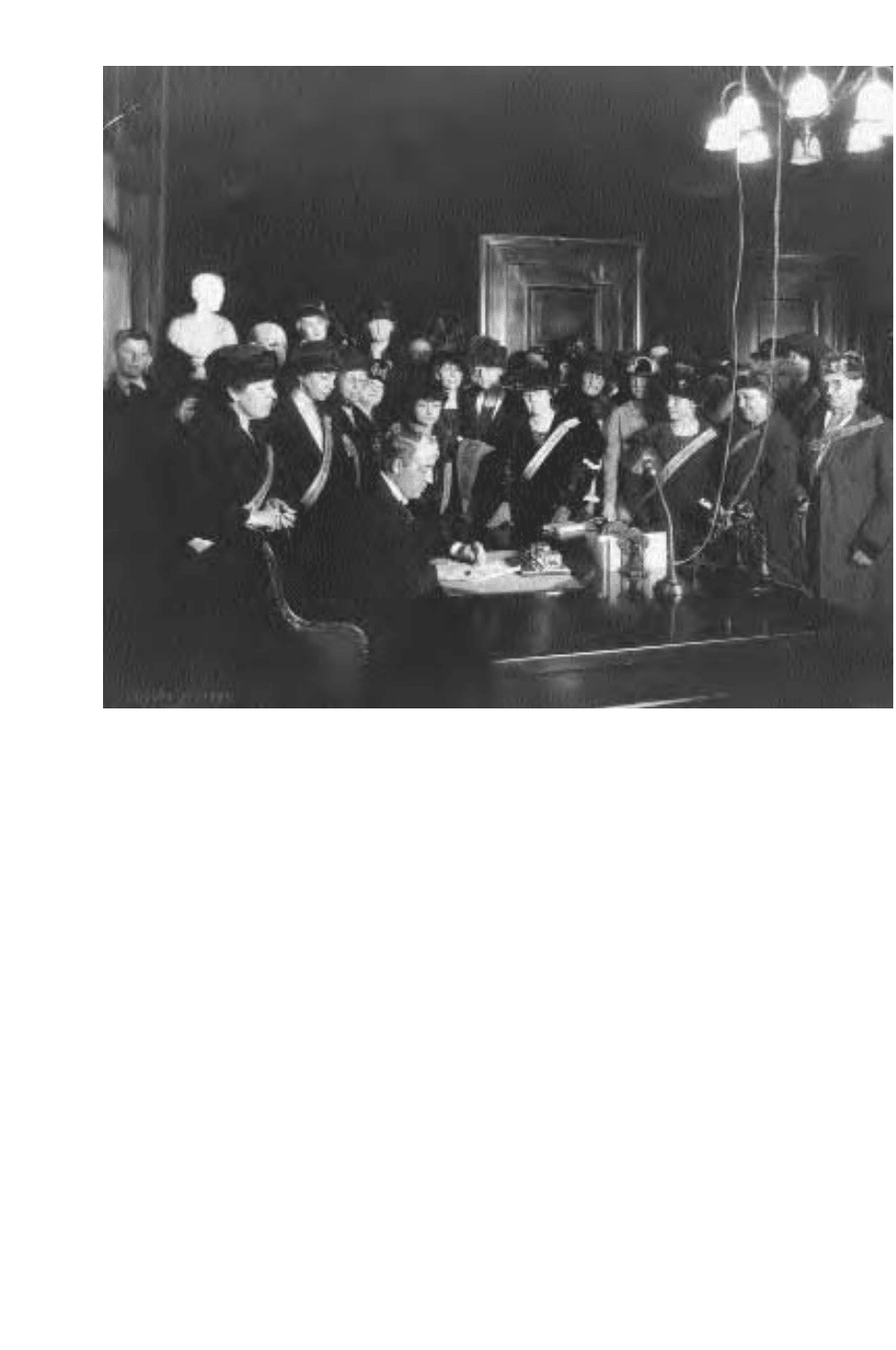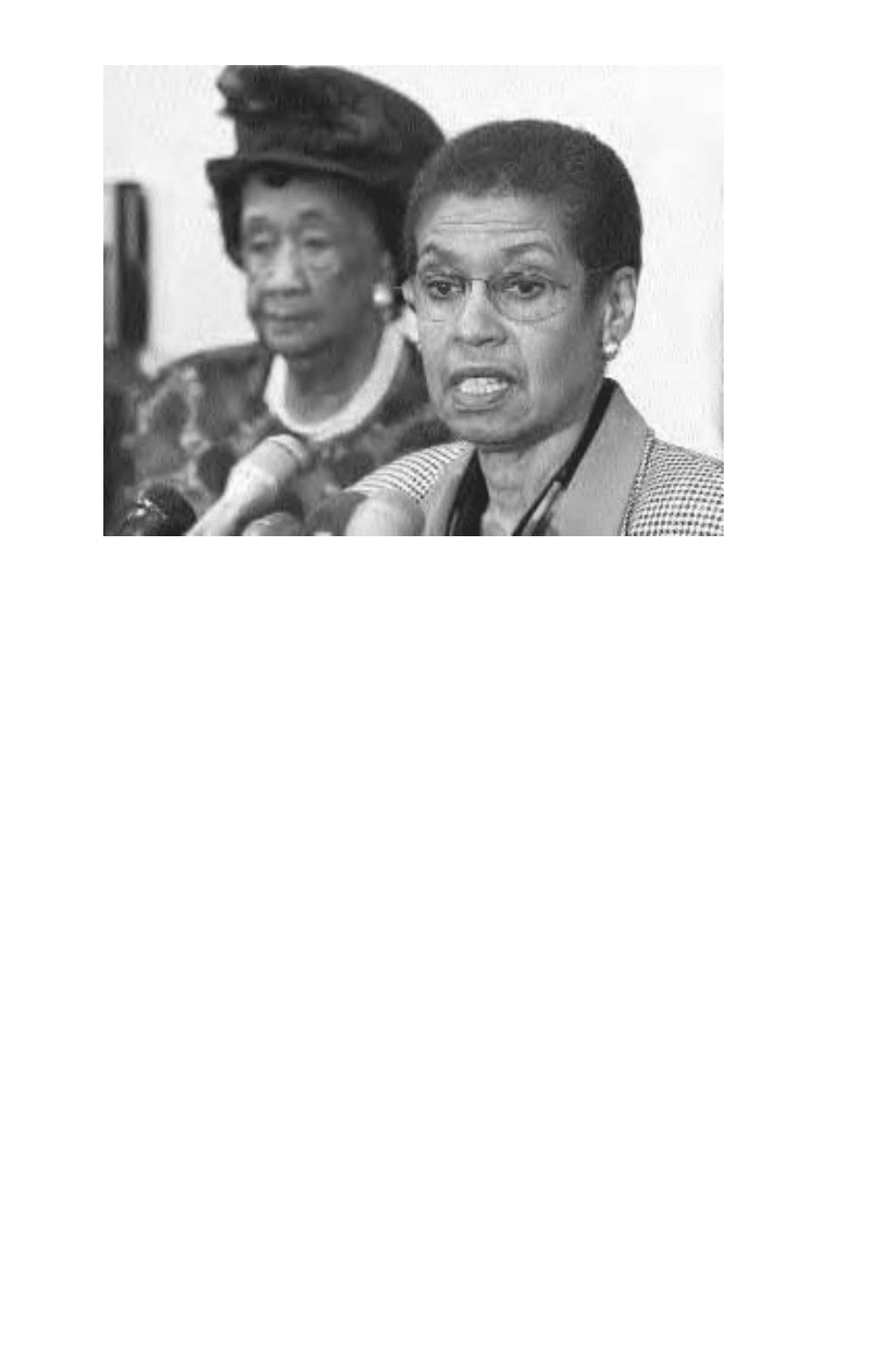Schenken Suzanne O’Dea. From Suffrage to the Senate: An Encyclopedia of American Women in Politics (2 Volumes)
Подождите немного. Документ загружается.


New York Radical Women
Formed by Pam Allen and Shulamith Firestone in 1967, New York Radi-
cal Women (NYRW) was one of the earliest radical women’s liberation
groups. The group’s most publicized demonstration occurred outside the
1968 Miss America beauty pageant in Atlantic City, New Jersey. Two hun-
dred women carried picket signs saying: “Women are people, not live-
stock” and “Can makeup cover the wounds of our oppression?” They des-
ignated a large container “the freedom trash can” and invited participants
to toss items of “female torture” into it. Hair curlers, girdles, bras, and
high heels went into the can, acts that attracted media attention. Reports
that women burned their bras at the event are untrue, but from those re-
ports feminists were given the derogatory appellation of “bra burners.”
The media attention alerted the nation that a new feminist movement was
emerging in this country. The group dissolved in 1969.
References Echols, Daring to Be Bad: Radical Feminism in America, 1967–1975
(1989)
News Media, Women Politicians and
The U.S. news media plays a substantial role in shaping the public’s ap-
praisals of political candidates and politicians, female and male. The me-
dia has a long tradition of reporting on political women differently than
it has reported on political men, encouraging the perception that women
do not belong in the political arena and perpetuating stereotypes of
women. The information news outlets offer about female candidates may
be accurate, but it also may emphasize matters of little consequence or use
prejudicial language.
Women’s physical appearance and attire have attracted undue atten-
tion, with descriptions of a woman’s height, weight, and hairstyle appear-
ing regularly. In 1982, for example, the Des Moines Register concluded that
Iowa Democratic gubernatorial nominee Roxanne Conlin’s changing hair-
styles over several years deserved space in its news section and displayed
several photos of her with different hairstyles. Other political women have
objected when their clothing received more space than their accomplish-
ments. In 1974, after President Richard Nixon resigned as a result of the
Watergate scandal, Mary Louise Smith became chair of the Republican Na-
tional Committee (RNC). At a time when the Republican Party was mired
in controversy, reporters asked Smith if she planned to dye her hair and if
she purchased her clothes from designers or off the rack. Such practices
trivialize political women and minimize their accomplishments.
The adjectives used to describe political women provide an example
of the news media’s tendency to stereotype women. Female members of
News Media, Women Politicians and 499

Congress have been described as “plucky,” “perky,” “spunky,” and “feisty,”
words that would not be used to describe a male member of Congress.
U.S. Senator Kay Bailey Hutchison (R-TX) was once described as an “ag-
ing cheerleader” and U.S. Representative Bella Abzug (D-NY) was called
“aggressive” and “abrasive.” Abzug noted that if she were a man, the words
courageous and dynamic would more likely have been used. RNC chair
Smith was consistently referred to as a gray-haired grandmother from
Iowa, which was true, but reporters did not characterize Democratic Na-
tional Committee chairman Robert Strauss as a gray-haired grandfather
from Texas.
Sex-role stereotyping in the news media takes several forms. Political
women are asked about their homemaking, sewing, and cooking skills,
questions that political men are spared. In addition, men are not asked
about their abilities to repair an automobile, build a house, or mow a
lawn. Reporters frequently question political women about how it feels to
be a woman officeholder, a question that men are not asked to address.
See also Abzug, Bella Savitzky; Hutchison, Kathryn (Kay) Ann Bailey; Public
Offices, Women Elected to; Smith, Mary Louise
References Braden, Women Politicians and the Media (1996).
9to5, National Association of Working Women
Founded in 1973 by Karen Nussbaum and nine other women, 9to5, Na-
tional Association of Working Women seeks to end workplace discrimi-
nation and to help women make the transition from welfare to work. The
organization and its 15,000 members work on several levels, from provid-
ing information to working women seeking advice to lobbying state legis-
latures and Congress. Its bill of rights for working women includes fair
pay, family-friendly policies, prorated benefits for part-time work, a voice
in job design, job security, safe and healthful workplaces, and workplaces
free from all forms of discrimination and harassment.
Through its Job Survival Hotline, staff members answer as many as
25,000 phone calls a year from women wanting advice on job security,
sexual harassment, workers’ rights, maternity leave, and discrimination.
Because ending sexual harassment in the workplace is a priority for 9to5,
the association’s director, Ellen Bravo, and Ellen Cassedy wrote The 9to5
Guide to Combating Sexual Harassment: Candid Advice from 9to5, the Na-
tional Association of Working Women in 1992. The book defines sexual ha-
rassment, provides statistics about it, offers advice on how to deal with ha-
rassers, and includes information on filing complaints.
9to5’s public policy priorities include tax benefits for family-friendly
companies, withholding government contracts from those companies
that are not family-friendly, increasing the minimum wage, increasing
500 9to5, National Association of Working Women

child care options, and requiring benefits for part-time employees. The
organization supported the Family and Medical Leave Act of 1993, the
Civil Rights Act of 1991, the 1990 child care legislation, and state laws on
workplace health and safety and sexual harassment.
The organization inspired the 1980 movie and song Nine to Five.
See also Bravo, Ellen; Child Day Care; Civil Rights Act of 1991; Family and
Medical Leave Act of 1993; Nussbaum, Karen; Pay Equity; Sexual Harassment
References www.feminist.com.
Nineteenth Amendment
The Nineteenth Amendment guarantees women the right to vote. Passed
by Congress on 4 June 1919, it was ratified and added to the U.S. Consti-
tution on 26 August 1920 after more than seventy years of lobbying, or-
ganizing, and campaigning for it.
The text of the Nineteenth Amendment reads:
The right of citizens of the United States to vote shall not be de-
nied or abridged by the United States or by any State on ac-
count of sex.
Nineteenth Amendment 501
Suffragists looked on
as Governor Edwin P.
Morrow of Kentucky
signed the Anthony
Amendment;
Kentucky was the
thirty-sixth state to
ratify the Nineteenth
Amendment, which
passed in 1920
(Library of Congress)

Congress shall have power to enforce this article by appropri-
ate legislation.
See also American Woman Suffrage Association; Anthony, Susan Brownell;
Catt, Carrie Clinton Lane Chapman; Mott, Lucretia Coffin; National American
Woman Suffrage Association; National Woman Suffrage Association; National
Woman’s Party; Paul, Alice; Seneca Falls Convention; Stone, Lucy; Suffrage
Nixon, Pat Ryan (1912–1993)
Pat Nixon was first lady from 1969 to 1974, the years her husband Richard
Nixon was president of the United States. Her life as a politician’s wife be-
gan in 1946, the year her husband ran for Congress, and continued until
he resigned from office as a result of the Watergate scandal. Throughout
Richard Nixon’s political career, Pat Nixon steadfastly stood by her hus-
band, campaigning for him, entertaining political supporters and other
guests, and traveling with him on international trips, especially during the
years he was vice president and president. During Richard Nixon’s first
term as president, she sought but did not identify a special project by
which she would become known. Although she continued to explore pos-
sibilities during his second term, the turmoil created by the Watergate
scandal overwhelmed her search. After Richard Nixon resigned from the
presidency, the couple returned to California.
502 Nixon, Pat Ryan
First Lady Patricia
Nixon witnessed her
husband’s inaugura-
tion ceremony, 1969
(Archive Photos)

Born in Ely, Nevada, Pat Nixon was named Thelma Catherine Ryan,
which she changed to Pat Ryan in 1931. After graduating from the Univer-
sity of Southern California in 1937, she taught school in Whittier, Califor-
nia, and met Richard Nixon when they both had roles in a community the-
ater production. They married in 1941, and she ended her teaching career.
References Eisenhower, Pat Nixon (1986).
Nolan, Mae Ella Hunt (1886–1973)
Republican Mae Nolan of California served in the U.S. House of Repre-
sentatives from 23 January 1923 to 3 March 1925. She won the election to
fill the vacancy created by the death of her husband, John Nolan. As chair
of the Committee on Expenditures in the Post Office Department, Mae
Nolan was the first woman to chair a House committee. She introduced a
measure for a minimum daily wage of $3 for federal employees, which
passed the House but failed in the Senate. She passed legislation that
transferred the Palace of Fine Arts from the federal government to the
City of San Francisco and that authorized the construction of a federal
building. She declined to run for a second term, saying politics was “en-
tirely too masculine to have any attraction for feminine responsibilities.”
Born in San Francisco, California, Mae Ella Nolan attended Ayres
Business College in San Francisco.
See also Congress, Women in
References Chamberlin, A Minority of Members (1973); Engelbarts, Women in
the United States Congress, 1917–1972 (1974).
Norrell, Catherine Dorris (1901–1981)
Democrat Catherine Norrell of Arkansas served in the U.S. House of Rep-
resentatives from 18 April 1961 to 3 January 1963. She entered politics
through her husband, Congressman William Norrell, serving as his staff
assistant. After her husband died in office, she won the election to fill the
vacancy. Congresswoman Norrell sought to protect Arkansas’s clay, tex-
tile, and lumber industries through tariffs and other government regula-
tion. She declined to run for a second term.
Born in Camden, Arkansas, Catherine Norrell attended Ouachita
Baptist College and the University of Arkansas. She then taught music and
was director of the Arkansas A&M music department.
After leaving Congress, Norrell was appointed deputy assistant sec-
retary of state for educational and cultural affairs by President John
Kennedy and served from 1963 to 1965. She was director of the State De-
partment’s reception center in Honolulu from 1965 to 1969.
See also Congress, Women in
Norrell, Catherine Dorris 503

References Office of the Historian, U.S. House of Representatives, Women in
Congress, 1917–1990 (1991).
Northrup, Anne Meagher (b. 1948)
Republican Anne Meagher Northrup of Kentucky entered the U.S. House
of Representatives on 3 January 1997. Among her congressional priorities
is the construction of a bridge over the Ohio River near Louisville.
Northrup has worked to increase accountability in federal programs and
seeks local government control of programs and the reduction of govern-
ment regulations to help small businesses. Northrup has also worked on
health care reform, focusing on making health care both affordable and
accessible. She founded the House Reading Caucus in 1998, a bipartisan
group that seeks to raise awareness of the problems of illiteracy.
Born in Louisville, Kentucky, Anne Northrup earned her bachelor’s
degree in economics and business from St. Mary’s College in 1970.
Northrup served in the Kentucky House of Representatives from 1987 to
1996.
See also Congress, Women in; State Legislatures, Women in
References Congressional Quarterly, Politics in America 1998 (1997); www.
house.gov/northrup/bio.htm.
Norton, Eleanor Holmes (b. 1937)
Democrat Eleanor Holmes Norton of the District of Columbia entered
the U.S. House of Representatives on 3 January 1991. As representative for
the district, Norton is a delegate and does not have a vote in House busi-
ness. She is the first African American woman elected to Congress from
the District of Columbia.
Born in Washington, D.C., Eleanor Holmes Norton earned her bach-
elor of arts degree from Antioch College in 1959 and her master of arts
degree in 1963 and her law degree in 1964 from Yale Law School. Norton
clerked for a federal judge following law school and then was assistant le-
gal director of the American Civil Liberties Union (ACLU). Representing
a white supremacist group that had been denied permission to hold a rally
in Maryland, she argued and won her first case before the U.S. Supreme
Court in 1968.
Norton headed the New York City Human Rights Commission from
1971 to 1977. She convinced several companies to provide maternity ben-
efits, helped change workers’ compensation policies, and won a woman
sportswriter the right to sit in the press box at hockey games, in addition
to other successes. From 1977 to 1981, Norton chaired the Equal Employ-
ment Opportunity Commission (EEOC). When she began her work
504 Northrup, Anne Meagher

there, the commission had a backlog of almost 100,000 worker com-
plaints. Norton changed the arbitration system and reduced the backlog
to 32,000 cases. Her work with the EEOC contributed to her decision in
1991 to urge the Senate to hold hearings after Anita Hill alleged that she
had been sexually harassed by U.S. Supreme Court nominee Clarence
Thomas. One of the women who marched to the U.S. Senate in October
1991, Norton explained: “As a black woman I identified with Anita Hill, as
the former chair of the EEOC and because I wrote the guidelines, I had a
special obligation and I believe if we didn’t walk the hearing would not
have been held.” She walked for “black women who have had their sexual-
ity trivialized and scandalized; black women who have had their sexuality
demeaned just as Clarence Thomas had done to Anita Hill.”
Congresswoman Norton has worked for civil rights, women’s rights,
law enforcement, education, and economic development and political in-
dependence for the District of Columbia. A unique situation exists in the
district. Residents pay taxes, but their congressional representative does
not have a constitutional right to vote on the floor of the House. In 1993,
Norton persuaded her colleagues to grant the district’s representative that
privilege, but when Republicans gained the majority for the 104th Con-
gress in 1995, the privilege was withdrawn. Norton relies on her persua-
sive abilities perhaps more than other members of Congress as she works
to represent the district’s needs for infrastructure maintenance and im-
provements, additional federal funds, and an adequate tax system.
See also Congress, Women in; Equal Employment Opportunity Commission;
Hill, Anita Faye; Sexual Harassment
Norton, Eleanor Holmes 505
Delegate Eleanor
Holmes Norton
(D-DC), with
Dorothy Height of
the National Council
of Negro Women, dis-
cussed possible mi-
nority voter intimi-
dation in the
elections, 1998
(Associated Press AP)

References Boxer, Strangers in the Senate (1994); www.house.gov/norton/
bio.htm.
Norton, Mary Teresa Hopkins (1875–1959)
Democrat Mary Teresa Norton of New Jersey served in the U.S. House of
Representatives from 4 March 1925 to 3 January 1951, making her the
dean of congresswomen at the time of her retirement. Norton’s political
careers emerged from her efforts to assist working women through a day
nursery she founded. Seeking financial support from Jersey City, she ap-
pealed to Mayor Frank Hague, who facilitated the city government’s mak-
ing a financial commitment to the nursery. In return, Norton permitted
Hague and the state Democratic committee to use her name on its list of
members.
After the woman suffrage amendment was ratified in 1920, both
Democrats and Republicans sought women’s votes and organizational
skills. Democrat Hague, one of the most powerful political bosses in U.S.
history, enlisted Norton’s help attracting women to the party and helped
her develop her political skills. For three years, she recruited and organ-
ized women voters. In 1923, Hague persuaded Norton to run for the Hud-
son County Board of Freeholders. On the county board, she worked for
the construction of a maternity hospital that the county would build and
support, an effort that resulted in the only facility in the country financed
that way. Her experience on the board exposed her to the inadequate serv-
ices and assistance available for disabled, old, or elderly people.
At Hague’s urging, Norton resigned from the board in 1924 to run
for the U.S. House of Representatives. With the help of Hague and the
mothers who had known Norton through the day nursery, she won the
election. She was the first Democratic woman elected to Congress who
had not followed her husband into the office and the first woman elected
from the East. After her election, a reporter asked her to pose for photo-
graphs: one hanging clothes on the line and the other cooking in her
kitchen. She refused, saying: “I do not expect to cook, and I do not expect
to wash any clothes in Congress.”
In 1925, Congresswoman Norton sponsored legislation that funded
construction of the first veterans’ hospital in New Jersey. By 1928, Norton
had become part of a circle of Democratic women activists that included
Eleanor Roosevelt, Belle Moskowitz, and Molly Dewson, all of whom
worked to involve more women in party politics. During the 1930s, Nor-
ton worked with Dewson to enhance the status of women working for the
party at the local level and sought to highlight their contributions to the
party and reward them.
506 Norton, Mary Teresa Hopkins

When Democrats gained the majority in Congress in 1931, Norton
became the second woman to chair a congressional committee, the Dis-
trict of Columbia Committee. At the time, Congress governed the district.
Norton worked for home rule for the district, to improve slum areas in the
city, to give women the right to serve on juries, and to permit women to
be police officers. She helped improved the district’s public transporta-
tion, made progress in improving its slums, passed the district’s first old-
age pension, and obtained an appropriation to build a hospital for tuber-
cular children. Her diligent attention to the district earned Norton the
nickname “Mayor of Washington.” She chaired the committee until 1937.
She next chaired the Labor Committee, making her the first woman
to chair a major legislative committee, beginning in 1937 and holding the
post until 1946. A strong supporter of President Franklin D. Roosevelt’s
New Deal legislation, she had been instrumental in the passage of the Na-
tional Labor Relations Act of 1935. As chair of the Labor Committee, her
most outstanding work was the Fair Labor Standards Act of 1938, which
took a full year to pass. Secretary of Labor Frances Perkins and Norton
shared a commitment to establish a minimum pay provision based upon
occupation and not sex, but the American Federation of Labor (AFL) op-
posed the wages and hours sections of the bill and wanted it killed. At the
request of the AFL, Hague asked Norton to kill the bill, a power she had
as committee chair, but she refused and took the bill to the House floor,
where it failed. In 1938, Norton negotiated a compromise with AFL and
brought out a new bill, but the Rules Committee buried it. Norton ob-
tained the necessary 218 signatures on a discharge petition to move the
bill out of the Rules Committee and onto the floor for debate. The bill
passed with its provision that maximum hours and minimum wages be
the same for men and women. The act established a minimum wage of
twenty-five cents an hour, a forty-hour workweek, and overtime wages at
time and a half. In addition, it prohibited child labor. After the bill’s pas-
sage, Norton said: “I am prouder of getting that bill through the House
than anything else I’ve ever done in my life.”
Her interest in the area of pay continued, and she was instrumental
in raising the minimum wage, eventually to seventy-five cents an hour. In
1945, she introduced the Women’s Equal Pay Act, but a measure enacting
the policy did not pass until 1963. As committee chair, Norton encoun-
tered the resentment of some of her male colleagues, who sabotaged some
legislation originating in her committee. In addition, important labor leg-
islation that was within the purview of her committee sometimes went to
other committees because a woman chaired the Labor Committee.
In 1941, Norton enlisted the help of eight of the nine women in Con-
gress to develop bipartisan support for a $6 million appropriation for fed-
Norton, Mary Teresa Hopkins 507

eral nursery schools for the children of women working in war industries.
During the years of World War II, the appropriation rose to $75 million.
Since the 1920s, when Norton had recruited women to join the ranks
of the Democratic Party, she had continued her efforts to encourage women
to become politically active. Her interests included displaced homemakers,
maternity leave, and equal pay for equal work for women. She wrote: “I
think women should first of all be interested in other women, interested in
other women’s projects, their dreams, and their ambitions. It’s up to women
to stand for each other.” She had intended to run for another term in 1950,
but while she was in the hospital with pneumonia, she decided against it.
She served as a consultant to the Labor Department until 1953.
Born in Jersey City, New Jersey, Norton’s formal education ended
when she was fourteen years old.
See also Congress, Women in; Displaced Homemakers; Equal Pay Act of 1963;
Family and Medical Leave Act of 1993
References Kaptur, Women of Congress (1996); Mitchell, “Women Standing for
Women: The Early Political Career of Mary T. Norton” (1978); Tomlinson,
“Making Their Way: A Study of New Jersey Congresswomen, 1924–1994”
(1996).
Novello, Antonia Coello (b. 1944)
Antonia Novello was the first woman, the first Puerto Rican, and the first
Hispanic surgeon general of the United States, serving from 1990 to 1993.
Before appointing her surgeon general, President George Bush confirmed
that Novello shared the administration’s opposition to abortion. Novello,
who was born with an abnormally large and malfunctioning colon that
required several surgical operations, explained: “Having been born with a
congenital defect makes me think that everything has a chance to live.” She
added: “Women have to move a little bit away from abortion as the only
issue to tackle.”
As surgeon general, Novello campaigned against teen smoking and
called on R. J. Reynolds Tobacco Company to stop using ads featuring Joe
Camel, a cartoon character that had more appeal to children than to adults.
She also asked beer and wine companies to end advertising campaigns di-
rected at children and teenagers, saying: “The ads have youth believing that
instead of getting up early, exercising, going to school, playing a sport or
learning to be a team player, all they have to do to fit in is learn to drink the
right alcohol.” Novello also focused attention on domestic violence, the
number of children not vaccinated against common infectious diseases,
and the high rates of injury and death experienced by farm families.
Born in Fajardo, Puerto Rico, Novello earned her bachelor of science
degree in 1965 and her medical degree in 1970, both from the University
508 Novello, Antonia Coello
